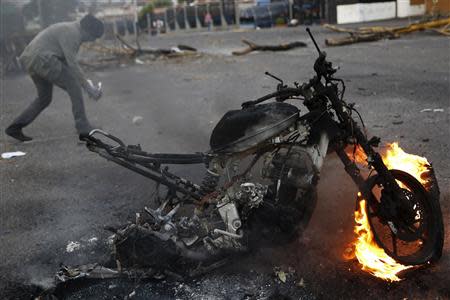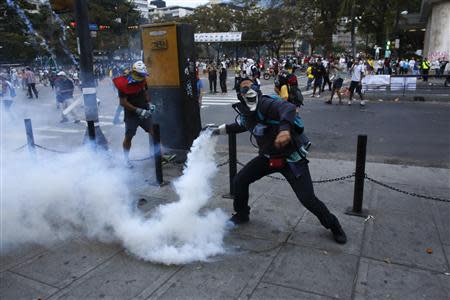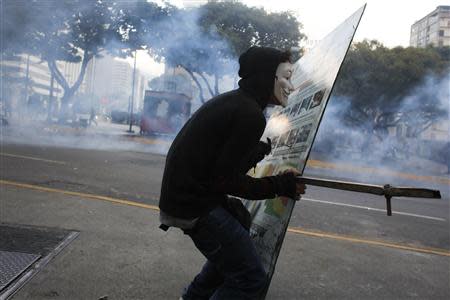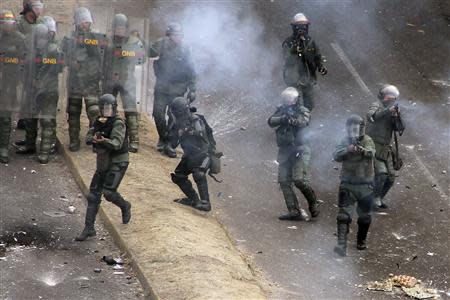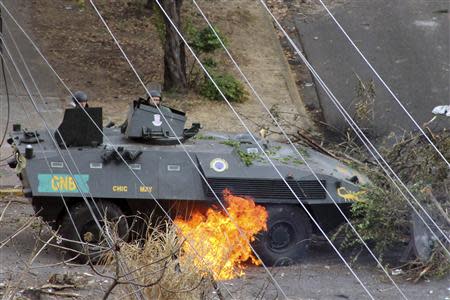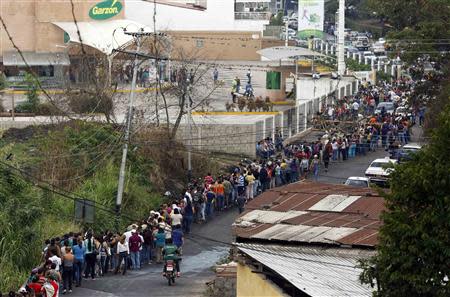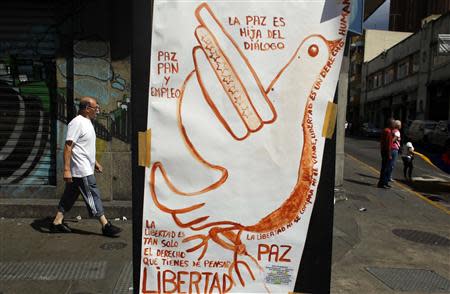Carnival holiday may take heat out of Venezuela crisis
By Andrew Cawthorne and Daniel Wallis CARACAS (Reuters) - Venezuelans began a week-long national holiday on Thursday as some protests still simmered, but President Nicolas Maduro's government was hoping the break would take the heat out of the nation's worst unrest in a decade. The 51-year-old successor to Hugo Chavez brought forward by two days a long national holiday weekend for Carnival when Venezuelans traditionally abandon cities and head for Caribbean coast beaches to unwind and party. There will be another day off for the March 5 anniversary of Chavez's death from cancer, meaning a week-long break that officials hope will dampen student-led street protests. In the capital Caracas, which has seen most of the at least 13 fatalities from this month's unrest, opposition supporters gathered in wealthy eastern neighborhoods. In familiar scenes from the last two weeks, when one group of demonstrators tried to block a major six-lane highway that runs nearby, security forces fired teargas to disperse them. "We love a long weekend, but things have changed ... we're tired of the shortages, the delinquency, the abuse," said 40-year-old travel agent Jennifer Diaz. "They can declare holidays all year long, but we're going to stay in the streets." In the city center, red-clad Maduro supporters rallied in remembrance of deadly price riots 25 years ago, which the president says helped propel Chavez to power a decade later. The students want Maduro to quit over grievances ranging from high inflation and shocking crime rates to shortages of basic food and alleged repression of political rivals. Though they have presented the biggest challenge to his 10-month-old administration and the worst unrest since street rallies against Chavez a decade ago, there is no sign Maduro could be ousted. On the contrary, he seems to be regaining the initiative by offering dialogue with foes and consolidating his leadership of the Socialist Party by uniting factions against a common enemy. INJURIES, ARRESTS About 150 people have been injured during the two-week crisis, and more than 500 people arrested, authorities say. Of those, 55 remain behind bars. They are mostly protesters, but include seven intelligence agents and security officials accused in the shooting of two people in downtown Caracas after a February 12 rally that sparked the worst trouble. The government says that about 50 people have died in total due to the protests, including indirectly linked cases such as people unable to reach hospitals due to blocked roads. The country's volatile western region, in the Andean foothills on the Colombian border, has seen the worst unrest, with protesters and security forces facing off day after day. In one middle-class neighborhood of San Cristobal city, a Reuters reporter watched demonstrators reinforcing a barricade on Thursday, winding wire around tree branches to strengthen the structure of chain-link fencing and corrugated metal sheets. "How long are we going to let them abuse us?" said one man, his shirt tied around his face. He accused protesters in Caracas of lacking the strength of their counterparts in San Cristobal and elsewhere. "The Caraquenos are only interested in parties, and not in getting rid of this joke of a government," he complained. That night, demonstrators at another barrier said they grabbed a motorcyclist who kept driving past, suspecting he was a plainclothes security officer. They beat him, stripped him to his underwear and then chased him off, before burning his bike. 'SPOILING CARNIVAL' Maduro accuses foes of trying to wreck Venezuelans' cherished Carnival celebrations and mocked opposition leaders as part of a wealthy elite flying out for the break. "There's not a single flight out left. They're all going abroad while they try and deprive the farm worker, the laborer, the student, of their Carnival," Maduro thundered in a speech to supporters late on Wednesday. "I'm not going to allow it. Carnival 2014 is going ahead!" In an attempt to calm tensions, Maduro hosted business and church leaders, and some opposition politicians, at a "peace conference" in his presidential palace on Wednesday night. Major opposition figures did not attend, however. With calls for both sides to sit down for talks pouring in from the Vatican to the United Nations and the White House, that strategy could backfire in terms of wider international opinion. Maduro has received strong support from leftist allies such as Bolivia and Cuba, and only relatively muted criticism from other nations, including Chile and Colombia. Brazil, whom Latin American governments increasingly look to for a lead, has kept quiet, saying Venezuela's problems are for it alone to resolve. The main opposition leader Henrique Capriles said he did not want to take part in a "photo op" without signs the president was serious about making concessions or facing real problems. Firebrand protest leader Leopoldo Lopez, who leads a radical opposition wing, is in jail on charges of fomenting the unrest. Lopez's party Voluntad Popular (Popular Will) said on Thursday the authorities issued a February 17 arrest warrant for its national coordinator, Carlos Vecchio, on similar charges to Lopez. Vecchio has not been seen in public for about two weeks. "All our solidarity with our friend @carlosvecchio," Capriles said on Twitter, before taking a jab at the president. "This is how Nicolas celebrates the start of Carnival." (Additional reporting by Brian Ellsworth and Carlos Garcia Rawlins in San Cristobal, and Eyanir Chinea and Tomas Sarmiento in Caracas; Editing by James Dalgleish and Jan Paschal)

